
Gospel: Mark 1:14-20
vs.14 After John had been arrested, Jesus went into Galilee.
There he proclaimed the Good News from God.
vs.15 “The time has come” he said “and the kingdom of God is close at hand.
Repent, and believe the Good News.”
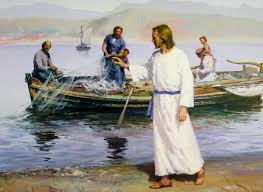 vs.16 As he was walking along by the Sea of Galilee he saw Simon and his brother Andrew casting a net in the lake – for they were fishermen.
vs.16 As he was walking along by the Sea of Galilee he saw Simon and his brother Andrew casting a net in the lake – for they were fishermen.
vs.17 And Jesus said to them,
“Follow me and I will make you fisher of men.”
vs.18 And at once they left their nets and followed him.
vs.19 Going on a little further, he saw James son of Zebedee and his brother John; they too were in their boat, mending their nets. He called them at once
vs.20 and, leaving their father Zebedee in the boat with the men he employed, they went after him.
*******************************************************************
We have three commentators available from whom you may wish to choose . Scroll down to the name of the commentator.
Michel DeVerteuil : A Holy Ghost priest, specialist in Lectio Divina
Thomas O’Loughlin: Professor of Hist Theol Univ of Nottingham
Donal Neary SJ: Editor of The Sacred Heart Messenger and National Director of The Apostlship of Prayer.
****************************************
Michel DeVerteuil
Lectio Divina with the Sunday Gospels
www.columba.ie
General Comments
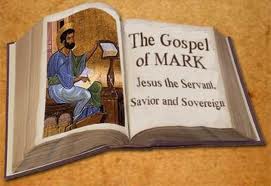 On this Sunday, we begin the continuous reading of St Mark’s gospel, which will be interrupted during Lent and Easter but will eventually take us to the arrival of Jesus in Jerusalem in November of this year.
On this Sunday, we begin the continuous reading of St Mark’s gospel, which will be interrupted during Lent and Easter but will eventually take us to the arrival of Jesus in Jerusalem in November of this year.
The journey begins in Galilee, the northernmost province of Palestine. This is where Jesus lays the foundation for his work of salvation. You might like to stay with this context of the passage – the humble beginnings (even in relationship with the rest of Palestine, Galilee is on the periphery) of what was to become a mighty work which has still not been completed.
The passage is in two sections:
– verses 14 – 15: this first section is a summary of the preaching of Jesus;
– verses 16 – 20: the call of the first disciples.
The first section is short, but every word is precious. Stay with the context of “after John had been arrested,” remembering the enormous impact that the Baptist had made on the whole country, and gauging from that the traumatic effect of his arrest. Yet, what seemed to be the end of a movement was the beginning of something new. Take “the kingdom of heaven” in a down-to-earth way, as an expression meaning the kind of society which would correspond to what God wants. “Is at hand” means that it is within our grasp.
The second section is a may seem artificial at a first reading, but it is the classical story of the moment of grace, sudden and yet totally natural in the sense that it seems to happen so easily, like a ripe fruit falls in our hand.
The two calls are clearly meant to be similar – St Mark is telling us that this is how a call always works out.
Prayer Reflection
Lord, we thank you for the changes that have taken place in our world.
They happened so suddenly and unexpectedly – yes it is always how moments of grace happen.
Like when John the Baptist was arrested and it seemed that the movement of religious renewal in the country had been blocked,
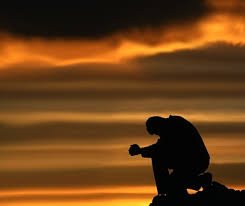 but that was the occasion for Jesus to go into Galilee and proclaim the Good News from God. So it was in those Eastern European countries and countries where violent regimes take control
but that was the occasion for Jesus to go into Galilee and proclaim the Good News from God. So it was in those Eastern European countries and countries where violent regimes take control
People just knew that a new era was at hand and they must change their ways of thinking and acting,
and trust that something great and wonderful was in store for them, even if for a while there is suffering. Thank you, Lord.
“Some would consider our hopes utopian. It may be that these persons are not realistic enough, and that they have not perceived the dynamism of a world which desires to live more fraternally.” …Pope Paul VI, Populorum Progressio
Lord, the role of the Church is to preach the good news of God to the world,
and the good news is that the Kingdom of Heaven is within our reach, if only we repent and believe that it is possible.
 Lord, we pray for all the preachers of the gospel,
Lord, we pray for all the preachers of the gospel,
especially those who give homilies at Sunday services.
Teach them not to be abstract in their preaching,
but to proclaim the Good News of God as Jesus did – as new possibilities which are at hand.
They must of course preach repentance – but not as an imposition from outside; rather, as good news within ourselves, good news which we can trust.
“To destroy human power nothing more is required than to be indifferent to its threats and to prefer other goods to those which it promises.
Nothing less, however, is required also.” ...R.H. Tawney
Lord, your Son Jesus knew how to break the power of evil.
When John was arrested, he went into Galilee and preached the good news
that the Kingdom of Heaven was at hand.
Lord, in the modern world we are accustomed to calculate things
before coming to decisions. We have feasibility studies, computer printouts and charts.
Eventually we think that personal relationships can be planned too,
like choosing a marriage partner or a friend,
picking those we want to work with us on a project.
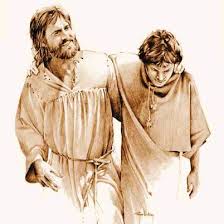 But we cannot plan those decisions.
But we cannot plan those decisions.
These things work by a kind of instinct,
like Jesus walking along the Sea of Galilee
and seeing two fishermen casting a net in the lake and then saying to them, “Follow me”
and they left their nets and followed him.
Lord, when we want to start some work, we like to start with the spectacular.
Teach us the way of Jesus, that when the time for action comes we should go to the periphery of life and choose a few companions, letting the kingdom grow from there.
********************************************************
Thomas O’Loughlin
Liturgical Resources for the Year of Matthew
www.columba.ie
Introduction to the Celebration
During this coming year we are going to read our way through the gospel preached by St Mark. And today we hear about Jesus’s first actions in inaugurating the kingdom of God. He proclaimed the good news that we should repent and begin life afresh; and he gathered about him the first members of his new people.
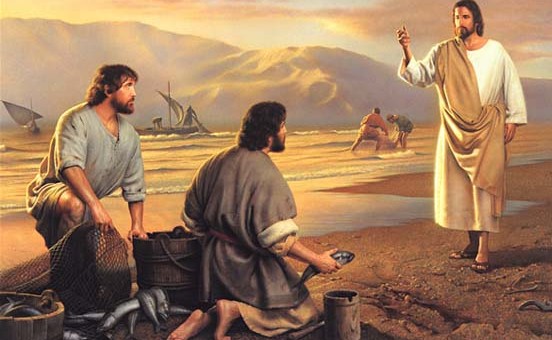 Here, now, today, we are gathering as that new people, gathering around him and listening to him in the Liturgy of the Word; and then with him we are going to offer thanks to our heavenly Father in the Liturgy of the Eucharist.
Here, now, today, we are gathering as that new people, gathering around him and listening to him in the Liturgy of the Word; and then with him we are going to offer thanks to our heavenly Father in the Liturgy of the Eucharist.
Homily Notes
1. There is a strange surprise in today’s gospel if we just look at it for a moment. Right at the start we hear Jesus’s great message: begin life afresh and believe in the good news that God loves us. This is exactly what we should expect: the story of a great prophet’s teaching should begin with his core message Then, immediately after that, we are not given any further explanation of this teaching., but we are told about how he recruited his first followers. We have all heard this so often that we forget that this is really strange, but it is.
2. For most people today, whenever they hear talk about Jesus, their first reaction is to say that he is a great religious leader, a prophet, or a teacher who said many wise things about how people should lead their lives. This is nothing new: many at the time of Jesus looked on him in just this way — a figure to be compared with Moses or Elijah or one of the prophets.
To many in the first years of Christianity as it spread around the ancient world, it seemed as if Jesus was simply a Jewish equivalent of a Greek philosopher: a wise man offering advice on how to live life well. Similarly today, many compare Jesus with the Buddha, Mahatma Gandhi, or some well-respected wise leader.
3. The basic idea in all these comparisons is that what we are seeking a wise teaching by which to live our lives. Alas, for people on this quest, very little of the gospel can be considered such ‘teaching‘: indeed, this year, when we read Mark’s gospel, we find that 37% is taken up with the account of the final days in Jerusalem. It is all about Jesus’s life and death, not about how we should live our lives.
4. Anyone who looks on Jesus as just a wise teacher will be very surprised that what they think is a book of his teachings, a gospel, moves from his message directly to the comparatively ephemeral matter of his organisational arrangements.
5. But the fact that this way of looking at Jesus is in the air around us must prompt us to remind ourselves about a few matters that are often so taken for granted that they are forgotten.
6. Jesus is our teacher, but he also the One sent by the Father to build up the new community. This is why Mark moves immediately from the core teaching to the call of the first members of this new people.
7. Jesus not only teaches us the way to the Father, he unites us to himself within the church in order to present us to the Father.
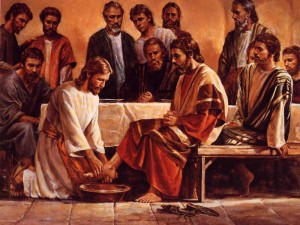 8. To follow Jesus is to not only listen and agree with his message, but to be willing to work with others he has called to build the kingdom.
8. To follow Jesus is to not only listen and agree with his message, but to be willing to work with others he has called to build the kingdom.
9. Mark preached his gospel to help us know who we are as a people — those who have chosen to become one with Jesus in baptism; he did not imagine that he was writing down wise religious sayings.
10. For the people of the gospel, to hear the call of Jesus to start life afresh is also to hear the call to follow him as his community.
***************************************************
Donal Neary SJ
Gospel Reflections
www.messenger.ie/bookshop/
Ordinary Things
There’s something very ordinary for a fisherman about washing nets. Daily work, done with some drudgery but knowing that it is essential for a good catch of fish which would feed the family at this time Jesus called his first apostles.
There is something sacred about the ordinary. About bathing a child, loving a spouse, daily employment, family time and all that goes to make up our days.
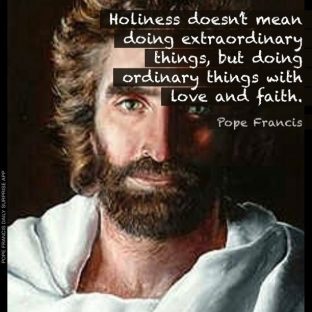 In the middle of all this God can surprise us and call us into his service. Our expectation is sometimes different – that we need long times of prayer to find God, or read about him, or do big things for him just as the smallest things are done out of human love, God is found in the ordinary.
In the middle of all this God can surprise us and call us into his service. Our expectation is sometimes different – that we need long times of prayer to find God, or read about him, or do big things for him just as the smallest things are done out of human love, God is found in the ordinary.
The old Irish spirituality had blessings for everything – for milking a cow, cleaning and dusting a room, visiting the sick and many more. there were prayers for meals, for a safe journey and a happy death. Our Irish spirituality found God as much in mountains and people as in the church, and often more so.
Maybe the disciples remember in difficult times the way they were called in their ordinary work, and found their ongoing call to follow the Lord in the ordinary of their lives for the rest of their lives.
Give me O Lord a love for the ordinary;
remind me often how ‘ordinary’ you were for so much of your life. Amen.